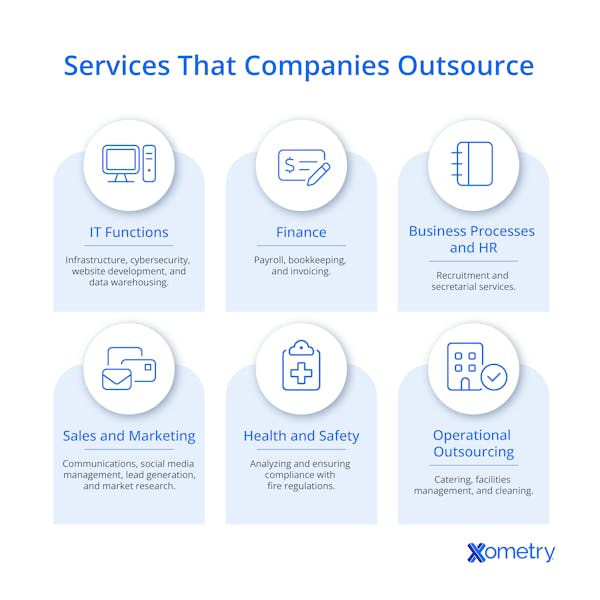Outsourcing is when companies hire external third parties to handle parts of their business operations. This strategy is popular because it slashes labor costs, boosts efficiency, gives access to specialized skills, and cranks up productivity. Common functions to outsource include IT, HR, and finance. Some companies, like Google, Nike, and Facebook, outsource their operations, while others specialize in providing these outsourcing services. Below are examples of both kinds of companies.
1. Facebook / Meta
Facebook, now Meta, is a large multinational corporation that operates social-media platforms like WhatsApp, Snapchat, and Facebook itself. The company outsources the monitoring and removal of harmful content on its platforms to third-party firms, such as Accenture. This outsourcing allows Meta to manage vast amounts of content more efficiently and focus on its core business operations.
2. Google
Google is a major multinational company specializing in search engine technology, artificial intelligence, cloud computing, and quantum computing. In 2018, for the first time, the number of contractors working for Google exceeded the number of direct employees. Google outsources certain functions like IT infrastructure management, software development, and maintenance to external firms, including many in India, allowing it to tap into a broader talent pool and scale operations efficiently.
3. Wells Fargo
Wells Fargo is an American company that offers a range of financial services mainly in America, but also globally. Wells Fargo uses offshore outsourcing in many countries in Asia, with 7,000 jobs in the Philippines and 20,000 jobs in India. The main function Wells Fargo outsources to these countries is customer service, primarily call centers. Wells Fargo has suffered a backlash and media attention for cutting domestic jobs by moving them overseas.
4. LinkedIn
LinkedIn is a social-media platform, owned by Microsoft, used to connect professions and grow networks. LinkedIn, like many, outsources its content moderation to other companies that can provide the service for less cost. This form of outsourcing may provide a cost-effective solution for the business. However, this strategy for content moderation has often been the subject of a lot of media attention due to the poor working conditions of the employed staff, mainly due to the toxic content they view on a regular basis.
5. American Express
American Express is a company providing financial services internationally. American Express uses offshore outsourcing for customer-support functions and has hired in both the Philippines and India. American Express is a leader in outsourcing activities as it set up its first offshore outsourcing site in New Delhi, India, in 1994. The site is now one of the three biggest for American Express in the world. The facility in New Delhi handles financial forecasting, accounting, incoming payments, and payables.
6. Nike
Nike is an American-based apparel and footwear brand that outsources all of its manufacturing to the Philippines, Vietnam, China, Indonesia, and Taiwan. It is estimated that 500,000 people are involved in the operation that Nike outsources. Using this model, Nike is able to take 47% of its market share, while Reebok (which until recently used limited outsourcing) only has a 16% market share.
7. IBM
IBM (International Business Machines Corporation) is one of the largest technology companies in the world. It employs 345,000 staff in 170 countries. IBM's main job type outsourced is software development roles.
8. Accenture
Accenture is a global business consultancy company, with around 733,000 employees worldwide, situated in over 200 cities across 49 countries. Accenture provides specialized supply-chain outsourcing services to help its clients anticipate customer demands, transform their business operations, and simplify processes. As well as providing advice, Accenture itself outsources many of its own operations. For example, in March 2023, Accenture issued new contracts to outsource a range of its IT services, banking software solutions, and application management and engineering.
9. UnitedHealth Group
UnitedHealth Group is a leading global healthcare provider. UnitedHealth Group has leveraged IT outsourcing to deliver better healthcare services. Its outsourcing contractor has been able to deliver a cost-effective solution for electronic healthcare records, healthcare analytics, and enhanced telemedicine services.
10. Pfizer
Pfizer is most well-known for its production of one of several COVID-19 vaccinations. When Pfizer created the COVID-19 vaccine, it could not make it fast enough to keep up with demand. Therefore, it outsourced many manufacturing functions to over 200 companies to produce its existing drug portfolio, so that Pfizer could focus on making the vaccine. This outsourcing consisted of offering work to established drug manufacturers to keep the production of established drugs running. This is not the first time that Pfizer has used outsourcing; it has used outsourcing as a standard practice since before 2008 for research and development. By outsourcing research and development, Pfizer can build R&D capacity, access more talent, focus on its core business function, and maintain operational flexibility.
11. Wipro
Wipro Limited, which has its headquarters in Bengaluru, India, is an IT outsourcing company. Using ServiceNXT™, its integrated service delivery platform, Wipro can manage the application landscape and infrastructure for organizations in the engineering and construction industries. The company also offers Wipro Digital Reference Architecture to provide a readily deployable IT system architecture and framework that includes technology, engineering, and processes. An example of an organization using Wipro is TalkTalk Telecom Group PLC.
12. Procter & Gamble
Procter & Gamble (P&G) sells consumer items including cleaning, health care, and cosmetic supplies, in over 180 countries. P&G started using outsourcing in 2003 when it signed an outsourcing partnership worth $4.2 billion. The company outsources IT Infrastructure, finance and accounting, HR, and facilities management to companies, including Jones Lang LaSalle, IBM, and HP. The qualitative result was that turnover improved by 99% in all areas where P&G operated, which is the majority of countries in the world.
13. SupportNinja
SupportNinja is an outsourcing service that offers professional services, data processing, content moderation, technical support, and customer services. SupportNinja operates in multiple locations across the United States and the Philippines. This allows the company to access a wider pool of talent and cost-effective labor.
14. Hello Rache�®
HelloRache® is an outsourcing platform in the medical industry that provides a virtual healthcare assistant for medical companies. HelloRache® is a US-based company that seeks to connect labor from the Philippines to medical companies in the US. It provides an outsourcing solution for companies that do not want to set up offshore facilities to use outsourcing in the Philippines. HelloRache® claims that by using its service, medical companies in the US can “focus on patient care, rely on HelloRache® experts, save time and money, and enhance the patient experience.”
15. MedVa
MedVa is a medical and dental company that offers outsourcing services. MedVa offers virtual assistants who can complete the services of a receptionist/admin role. MedVa can help reduce staffing costs for medical practices.
What Is Outsourcing in Business?
Outsourcing is often used as a business practice whereby a third party outside of the company is hired to carry out services or manufacture goods that were previously performed in-house by the company’s own staff and employees. This can be on a contracted or ongoing basis. Outsourcing services are commonly seen in three main areas: onshoring, nearshoring, and offshoring. Outsourcing in business was popularized as a formal business strategy in the late 1980s, notably gaining traction after a 1989 Forbes article credited Kodak’s IT outsourcing deal as a milestone, and quickly became a business economics staple throughout the 90s.
Why Do Companies Outsource?
Many companies utilize the option of outsourcing various parts of their business operations for a number of reasons.
Firstly, it enables businesses to significantly reduce labor costs. Transferring manufacturing processes from in-house to external enterprises allows companies to save on labor costs, overhead, equipment, and technology required to run the business operations.
Secondly, it enables the business to concentrate its energies and attention on its core aspects.
Thirdly, companies may choose to outsource to improve efficiency and productivity, as a third party hired to provide certain services may have the knowledge and expertise to perform smaller tasks better than the firm itself. An example of this would be outsourcing certain aspects of IT functions, such as cybersecurity.
Finally, another reason why companies might choose to outsource some of their operations is the scalable capacity it affords.
When the business is experiencing increased demand for its product, it is easier to rapidly scale to meet the demand when hiring services from an external provider. This avoids having to hire additional employees and going through the process of onboarding them, which can be extremely time-consuming. Additionally, should the demand for the product decline, third-party services can be much more easily reduced than reducing internal headcount, which typically involves longer notice periods, legal constraints, and higher severance costs.
Does Outsourcing Improve Productivity and Efficiency?
Yes, outsourcing various services to external third parties can greatly improve the productivity and efficiency of business operations. Firstly, outsourcing allows companies access to regions with lower labor costs, thus making the operational costs of the business more efficient. Beyond financial reasons, outsourcing improves the productivity of the business by allowing the workforce to focus on the core aspects of their offerings. For example, experienced electricians or plumbers spend the vast majority of their day at work sites, physically doing their work.
Outsourcing tasks, such as phone calls and appointments, enables the professional to have more time for their physical work of inspections and repairs without disruption, thus making them more efficient. Additionally, outsourcing certain aspects, such as IT infrastructure, to a third party enables a company to access specialized skills and up-to-date technology while reducing the burden of internal recruitment, training, and long-term commitment.
By having a reliable and high-quality technology service from an external provider, the business is able to function more efficiently and its workforce is able to focus on its core operations, thus making it more productive.
Does Outsourcing Reduce Operational Costs?
Yes, outsourcing has the potential to significantly reduce a company’s operational costs and is one of the main attractions of this strategy for many businesses. By investing in this type of service, companies can eliminate the requirement to heavily invest in infrastructure, personnel, equipment, overheads, and technology.
Outsourcing companies can offer their services at a lower cost than companies providing in-house services, sometimes by virtue of their location (usually seen in offshoring, and sometimes in nearshoring) or because specialized suppliers have an exclusive focus on certain areas.
Additionally, companies can reduce costs associated with training, hiring, and employee benefits by outsourcing personnel, especially with regard to hiring individuals for a role that requires specialized expertise or hard-to-fill niche roles.
Does Outsourcing Hurt the Economy?
No, overall outsourcing is more beneficial than it is damaging for the economy, though this is the subject of debate. One of the ways in which outsourcing aids the economy is by lowering the barrier to entry within a given industry.
Enabling small start-up companies to access skills and resources from an external third party reduces the amount of initial capital injection required by the startup to invest in infrastructure such as technology or production sites. This increases competition within that particular industry, ensuring greater quality of products.
Additionally, the cost of production is reduced by outsourcing labor, which improves the efficiency of business operations and makes the end product less expensive for the end consumer. This, in turn, encourages spending and translates to increased profit margins for shareholders, greatly benefiting the economy by increasing cash flow.
However, outsourcing can also negatively impact job displacement and wage pressure in certain sectors of the domestic economy, especially for lower-skilled workers, which is why it remains a debated topic.
What Services Do Companies Outsource?
There are a number of services that companies commonly choose to outsource to a third party, such as:

Is Outsourcing Better Than Onshoring?
Outsourcing allows for greater options when it comes to hiring services provided by an external third party. Outsourcing incorporates any services that are hired outside of the company from an externally sourced provider. This could be for any industry and from any geographical location in the world, regardless of where the company is based. Onshoring is specifically limited to hiring services from a provider based in the same country as the business. While both share many of the same advantages, the key benefit of outsourcing vs. onshoring is that outsourcing allows greater flexibility to hire services from a country near the company's headquarters (nearshoring) or from further afield (offshoring). This allows for a greater choice of providers and often lowers the costs associated with the labor provided by offshore or nearshore companies.
What Is the Difference Between Outsourcing and BPO?
The difference between outsourcing and BPO is that BPO (Business Process Outsourcing) refers specifically to outsourcing standardized, ongoing business processes to third-party providers. This is usually in relation to ongoing or repetitive business processes such as HR, finance, accounting, or customer relationship management (CRM).
Outsourcing, on the other hand, tends to encompass a wider scope, including project-based, occasional, or specialized tasks beyond just business processes.
While outsourcing and BPO are very similar, their key differentiators are in the nature and scope of the processes assigned to the external provider. The level of expertise the third party provides is also a key difference between the two: outsourcing assignments tend to require sophisticated specialist expertise, whereas BPO services tend to be more standardized.
Summary
This article presented outsourcing companies, explained each of them, and discussed the various aspects of outsourcing. To learn more about outsourcing, contact a Xometry representative.
Xometry provides a wide range of manufacturing capabilities and other value-added services for all of your prototyping and production needs. Visit our website to learn more or to request a free, no-obligation quote.
Copyright and Trademark Notices
- HELLO RACHE® is a registered trademark owned by Temark International, Inc.
- ServiceNXT™ is a trademark of Wipro Limited
Disclaimer
The content appearing on this webpage is for informational purposes only. Xometry makes no representation or warranty of any kind, be it expressed or implied, as to the accuracy, completeness, or validity of the information. Any performance parameters, geometric tolerances, specific design features, quality and types of materials, or processes should not be inferred to represent what will be delivered by third-party suppliers or manufacturers through Xometry’s network. Buyers seeking quotes for parts are responsible for defining the specific requirements for those parts. Please refer to our terms and conditions for more information.


